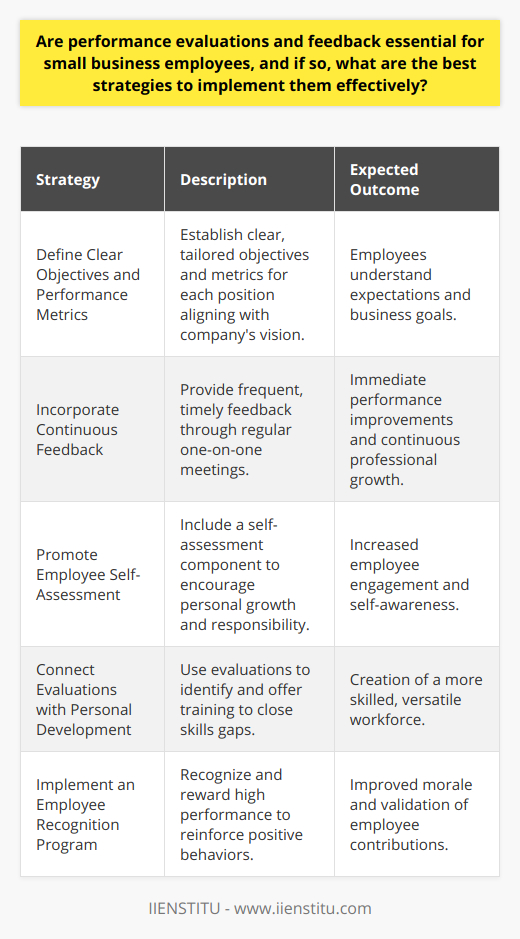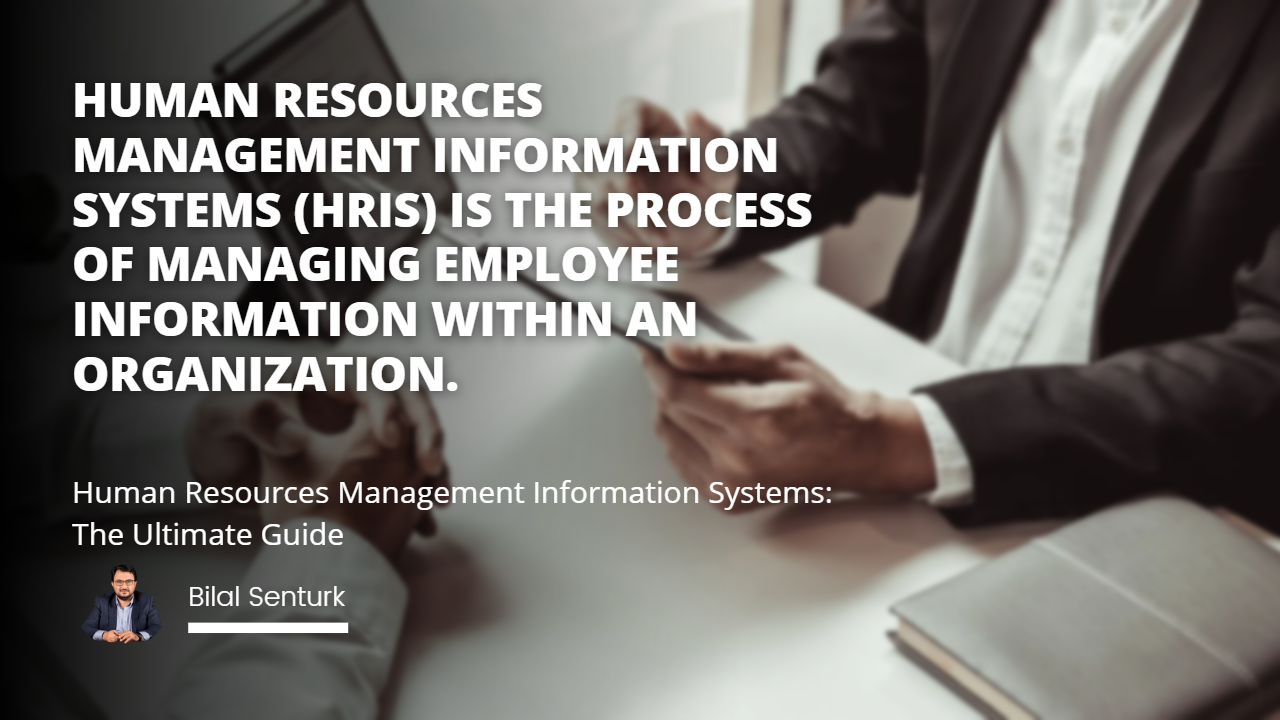
Having a human resources (HR) department is essential for the success of any business, regardless of size. It’s important to have someone managing payroll and employee benefits, as well as ensuring that all legal requirements are met. But it can be difficult for small businesses to establish an effective HR department due to limited staff and budget. help make things easier, here are 10 human resources tips specifically designed for small businesses.
From recruitment strategies to training initiatives, these guidelines will help you build a strong foundation for your HR team and ensure your employees feel valued in their roles. With the right human resources practices in place, you can create an environment where everyone feels supported and motivated by their work!
Overview of human resources and its importance for small businesses
When it comes to human resources, small businesses often struggle due to limited budgets and staff. However, human resources is an essential part of any business, regardless of size. It’s important to have someone managing payroll and employee benefits, as well as ensuring that all legal requirements are met.
To make things easier for small business owners, there are a few human resources tips specifically designed for them. From recruitment strategies to training initiatives, these guidelines can help create a strong foundation for one's HR team and ensure employees feel valued in their roles.
A successful human resources program also involves creating a positive work environment where everyone feels supported and motivated by their work. Such initiatives may include creating an effective performance evaluation system, leveraging technology to streamline HR processes, or providing employee benefits that enhance morale.
Additionally, it’s important to be aware of any legal requirements applicable to the business and common human resources mistakes that should be avoided in order to maintain compliance. Using real-world examples of successful human resource practices can also provide guidance on how to create an efficient HR system while saving costs.
Therefore, it’s essential for small businesses to take the time necessary when developing their human resources programs in order to build a thriving workplace culture and reach their goals effectively.
Recruitment Strategies for Small Businesses
For small businesses, it is essential to have an effective human resources strategy in place to ensure the success of the business. Recruitment is one of the most important human resources practices that can help organizations achieve their goals and build a strong team.
In today’s competitive job market, small businesses often struggle to attract talented candidates due to limited budgets and resources. As such, they must devise creative recruitment strategies in order to remain competitive. For example, organizations may choose to focus on passive recruiting tactics such as leveraging social media platforms or online job postings in order to reach potential applicants. Additionally, implementing referral programs or providing internship opportunities can also be advantageous for small business recruitment efforts.
It’s also important for human resource teams to develop efficient selection processes that are tailored to the organization’s specific needs. This involves carefully assessing necessary qualifications and competencies needed for each role and developing interview questions that measure those criteria. Furthermore, conducting background checks and reference checks can help human resource teams make reliable hiring decisions for their organization.
By employing these strategies and carefully considering each candidate’s qualifications and fit with the team culture, human resource teams can ensure successful recruitment outcomes that will benefit both the organization and its employees!
Training Initiatives to Support Growth
Training initiatives are an essential human resources practice to support business growth and employee development. By providing employees with the necessary guidance and skills, human resource teams can leverage their staff’s talents to help the organization reach its goals. This involves developing programs that aim to increase productivity, creativity, and morale among employees.
For instance, human resource teams can offer corporate education programs that teach employees the latest business trends or communication skills seminars to help them network effectively with colleagues. Additionally, human resource directors can also implement cross-training initiatives in order to increase operational efficiency and create a more knowledgeable team.
Furthermore, human resource teams should strive to provide employees with professional development opportunities that help them grow within their roles and gain new skills that will improve their job performance. By devising creative training initiatives and encouraging employees to explore different skill sets, human resource teams can create a workplace environment that is conducive to learning and growth-oriented outcomes.
Employee Benefits That Enhance Morale
Creating a positive workplace environment and providing employees with job satisfaction are two fundamental human resources practices. While compensation is an important factor in employee motivation, human resource teams should also focus on providing unique benefits and perks that can positively impact morale.
For example, organizations may choose to offer flexible work arrangements or telecommuting opportunities for their staff to improve work-life balance. Additionally, human resource teams can provide additional financial incentives such as 401(k) match programs or tuition reimbursement plans to reward employees for their hard work and commitment.
Furthermore, human resource teams can also initiate employee engagement initiatives such as team building activities or monthly recognition awards to strengthen the bond between colleagues and create a sense of camaraderie within the organization. By offering these types of benefits and fostering a sense of connection between staff members, human resource teams can ensure that employees remain motivated and satisfied with their work environment.
Legal Requirements All Small Businesses Must Meet
When running a small business, human resources practices are essential for ensuring organizational success. From recruitment and training initiatives to employee benefits that enhance morale, human resource teams must create strategies that support the organization’s growth while also providing employees with job satisfaction.
In addition to implementing effective human resources practices, it is also important for small businesses to be aware of the legal requirements they must meet in order to operate within their jurisdiction. Understanding these laws and regulations can help ensure compliance and prevent potential liabilities from arising. Such legal requirements include necessary paperwork such as employment agreements or tax forms; labor laws pertaining to wages, overtime pay, minimum age standards, etc.; health and safety standards; discrimination protection policies; and more.
By adhering to these guidelines and taking proactive steps towards compliance, human resource teams can help protect their organizations from any potential risks associated with non-compliance.
Examples of Successful Human Resources Practices in the Real World
In order to understand human resources practices and their potential impact on organizational success, it is important to look at real-world examples that illustrate how human resources teams have achieved positive results. For instance, one human resource team successfully implemented a corporate education program which provided employees with additional training opportunities in key areas such as leadership skills and customer service strategies.
Related Course: Online Leadership Course
As a result, the organization experienced an increase in employee productivity and engagement levels. Additionally, another human resource team was able to create a unique benefits package for their staff members which included financial incentives such as 401(k) match programs or tuition reimbursement plans. This strategy resulted in improved morale among employees who felt valued and motivated by the organization’s human resources team.
By examining successful human resources practices from the real world, human resource teams can gain valuable insight into how to create effective strategies that provide employees with job satisfaction and support organizational success.
Creating an Effective Performance Evaluation System
Performance evaluations are essential tools in human resources management as they can be used to identify strengths and weaknesses among staff members, as well as measure individual performance against company goals.
When creating a performance evaluation system, human resource teams should focus on developing clear criteria that is measurable and relevant to each employee’s job role.
Additionally, feedback should also be given regularly in order to ensure any potential issues are identified and addressed quickly.
Furthermore, human resource teams should ensure that any disciplinary action taken following a performance evaluation is fair and consistent in order to promote an open and transparent work environment.
By developing an effective performance evaluation system, human resource teams can ensure that employees are held accountable for their actions while still being given the opportunity to grow and develop within the organization.
Leveraging Technology to Streamline HR Processes
The human resource field has seen a recent increase in technology-driven solutions that seek to streamline processes such as recruitment, payroll management, data collection and analysis, compliance tracking, etc.
For example, some human resources teams have implemented automated systems that use artificial intelligence (AI) algorithms to evaluate job applications more effectively or automate employee onboarding processes.
Additionally, human resource personnel can leverage cloud-based software programs to facilitate collaboration between team members and streamline administrative processes. Leveraging technology can help human resource teams become more efficient in their day-to-day activities while also freeing up resources that can be used to focus on other strategic initiatives.
Common Human Resources Mistakes to Avoid
Human resources management involves many different components, which means mistakes are bound to happen. However, human resource teams should strive to avoid common errors such as neglecting the importance of compliance with labor laws or failing to provide employees with clear expectations around their roles and responsibilities.
Additionally, human resource personnel should ensure they stay up-to-date with any changes in industry standards and regulations so as not to fall behind competitors when it comes to employee benefits or pay scales. Furthermore, human resource teams should also be wary of making decisions that may result in a lack of diversity or cause disharmony in the workplace.
By avoiding these common human resources mistakes, human resource teams can ensure their organization is following best practices when it comes to managing its human capital.
In conclusion, human resources management encompasses many different elements, from legal requirements and creating a positive work environment to leveraging technology and avoiding common mistakes. Human resource teams should strive to develop strategies that support organizational goals while also providing employees with job satisfaction. By examining successful human resource examples from the real world, human resource personnel can gain valuable insight into how to create effective strategies for their own organizations. With the right knowledge and tools at hand, human resource teams can help promote an open and collaborative work environment while ensuring their organization is compliant with all relevant laws and regulations.
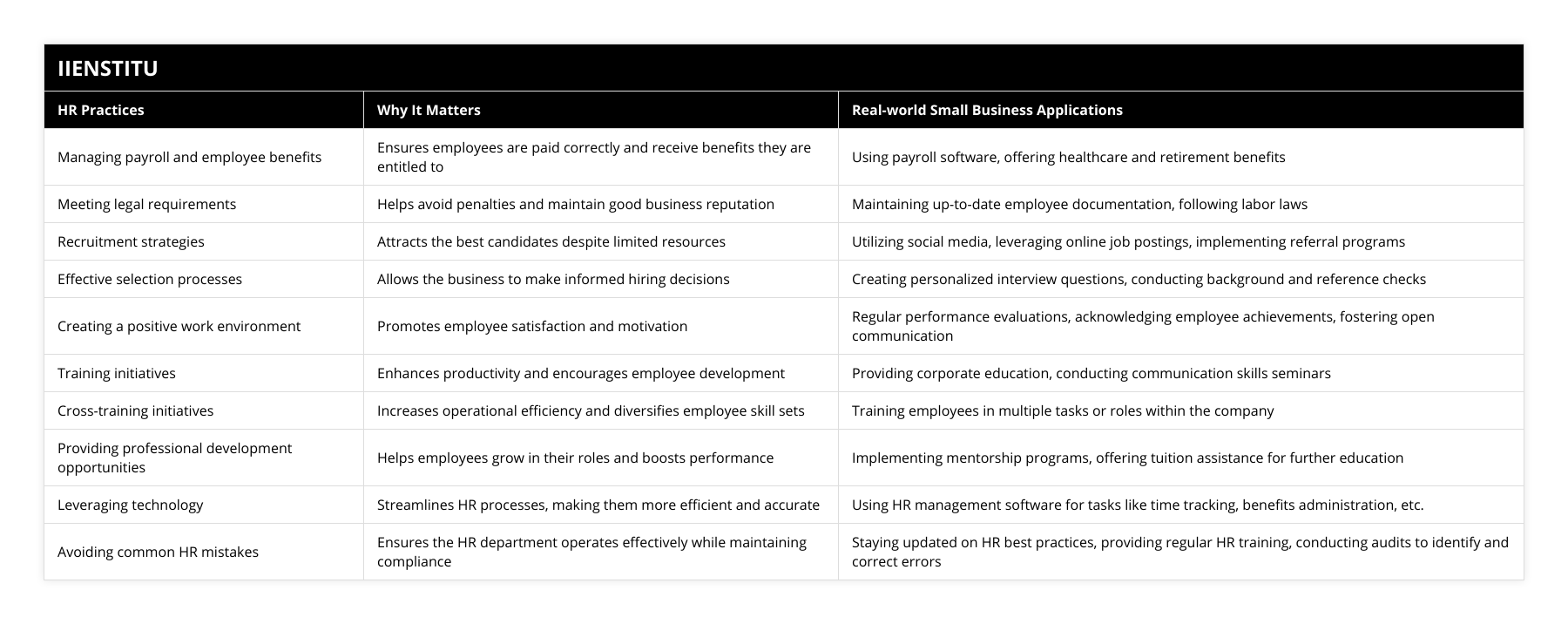
Frequently Asked Questions
What are the key components of effective human resources management for small businesses?
Recruitment and Selection: Finding the right people for the right roles is essential for any small business. This involves a thorough recruitment and selection process that includes job postings, interviews, background checks, and other assessment methods.
Training and Development: Providing employees with the skills and knowledge needed to perform their jobs is important for any business. Developing a training program ensures that employees are knowledgeable about the company's goals, products, services, and processes.
Performance Management: Assessing and managing employee performance is critical for any business, small or large. This includes setting objectives, measuring performance, providing feedback, and rewarding results.
Compensation and Benefits: Establishing a competitive salary and benefit package is key to attracting and retaining top talent. It's also important to consider other benefits such as health insurance, retirement plans, and paid time off.
Employee Relations: Establishing and maintaining good relations with employees is essential for any business. This includes creating an open and respectful environment and communicating clearly with employees.
Legal Compliance: Staying up-to-date on employment laws and regulations is critical for any business. This includes understanding and complying with labor laws, tax laws, and other regulations.

How can I ensure I am providing a safe and comfortable work environment for my employees?
Ensure that all safety protocols are up to date and regularly reviewed.
Provide adequate and comfortable furniture and equipment.
Implement a zero-tolerance policy for harassment or bullying of any kind.
Encourage feedback from employees and regularly check in to ensure their needs are being met.
Have an open door policy and provide support for any issues that arise.
Provide regular training and development opportunities.
Promote a healthy work-life balance.
Provide regular breaks to help reduce stress levels.
Make sure the physical environment is well lit, ventilated, and clean.
Establish an emergency plan in case of any accidents or injuries.
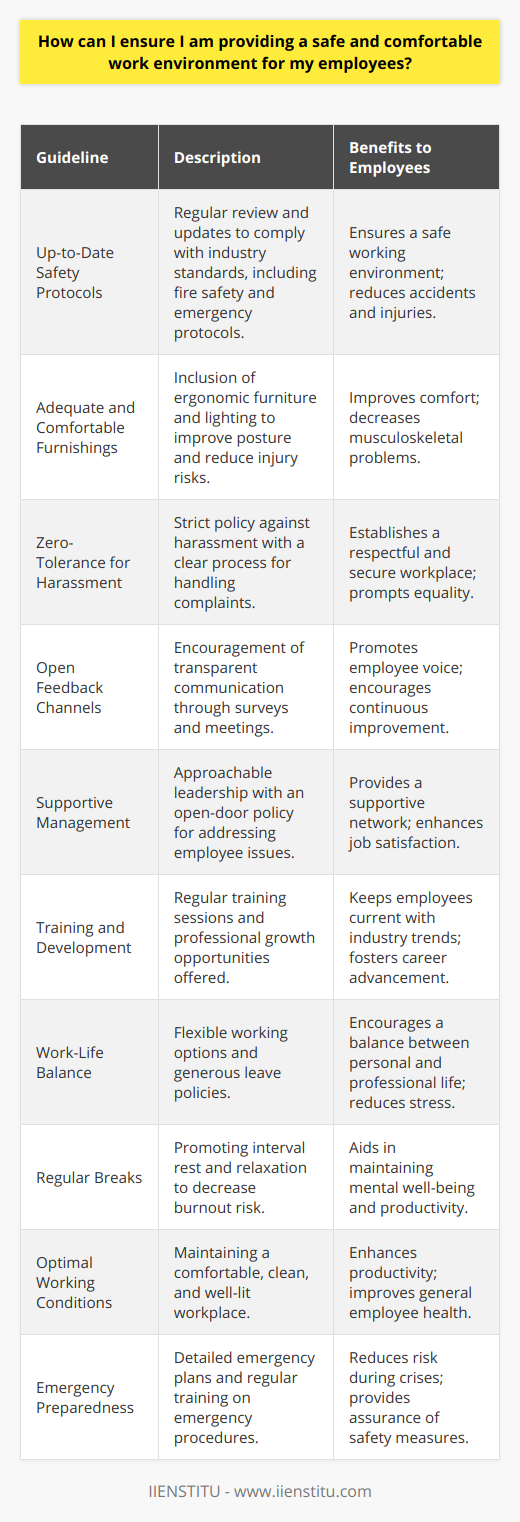
What are the best practices for recruiting and onboarding new staff for a small business?
Develop a clear job description: Define the responsibilities, qualifications, and expectations for the job.
Use multiple recruitment channels: Utilize job boards, social media, employee referrals, and other methods to find the best qualified candidates for the job.
Screen and interview candidates: Give candidates the opportunity to demonstrate their skills and knowledge.
Offer a competitive salary and benefits package: Ensure that the compensation package is competitive with the marketplace.
Make the onboarding process efficient and easy: Create an onboarding checklist, set up orientations and meetings with key personnel, and provide onboarding materials and resources.
Ongoing training and development: Provide ongoing training and development opportunities to ensure your new employees’ success.
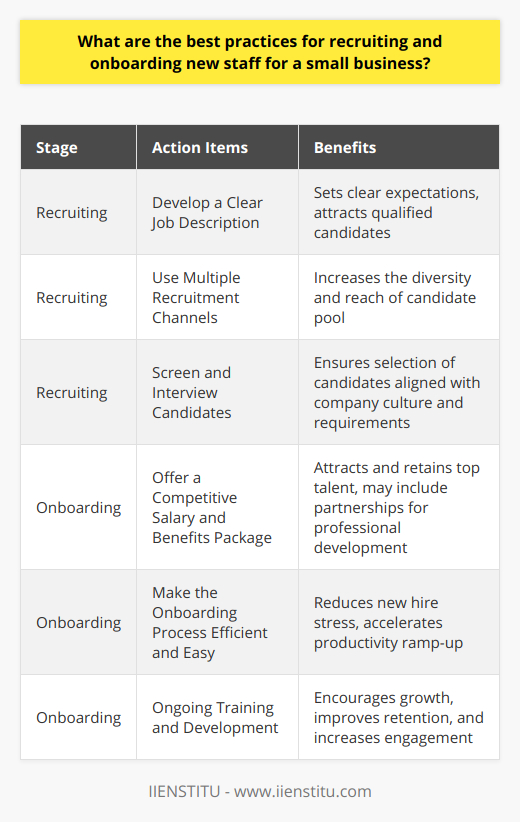
What are the most essential human resources functions for small business success?
Essential Human Resources Functions
Small businesses often encounter unique challenges related to human resources (HR), which significantly influence their success. To ensure sustainable growth, small businesses must prioritize three primary HR functions: employee recruitment and retention, performance management, and legal compliance.
Employee Recruitment and Retention
One critical function for small businesses is to recruit the right employees, competently matching their skills and expertise with the requirements of the company. This is crucial for a strong foundation in the early stages of growth. Similarly, retaining valuable employees is equally vital. Therefore, small businesses should create a supportive work environment and provide competitive benefits to foster employee loyalty and commitment, which contributes to sustainability and expansion.
Performance Management
Another essential HR function is performance management. Small businesses must maintain regular assessments and provide constructive feedback to employees to help them grow professionally. These evaluations also prioritize setting attainable goals and addressing any performance-related concerns. Effective performance management can ultimately lead to increased productivity, employee engagement, and a better overall performance from the workforce.
Legal Compliance
Lastly, legal compliance is an indispensable HR function, as small businesses must abide by a set of employment laws and regulations to avoid any legal issues. These regulations pertain to employee rights, workplace safety, wage and hour laws, and anti-discrimination policies. It is crucial for small businesses to maintain up-to-date knowledge on these rules to protect both the company and its employees, thus maintaining a strong and ethical foundation for business success.
In conclusion, effective management of HR functions plays a crucial role in the success of small businesses. Prioritizing employee recruitment and retention, performance management, and legal compliance helps companies optimize their workforce and thrive in a competitive market. Emphasizing these functions will not only contribute to a company's steady growth but also create a stronger organizational and ethical foundation for future success.
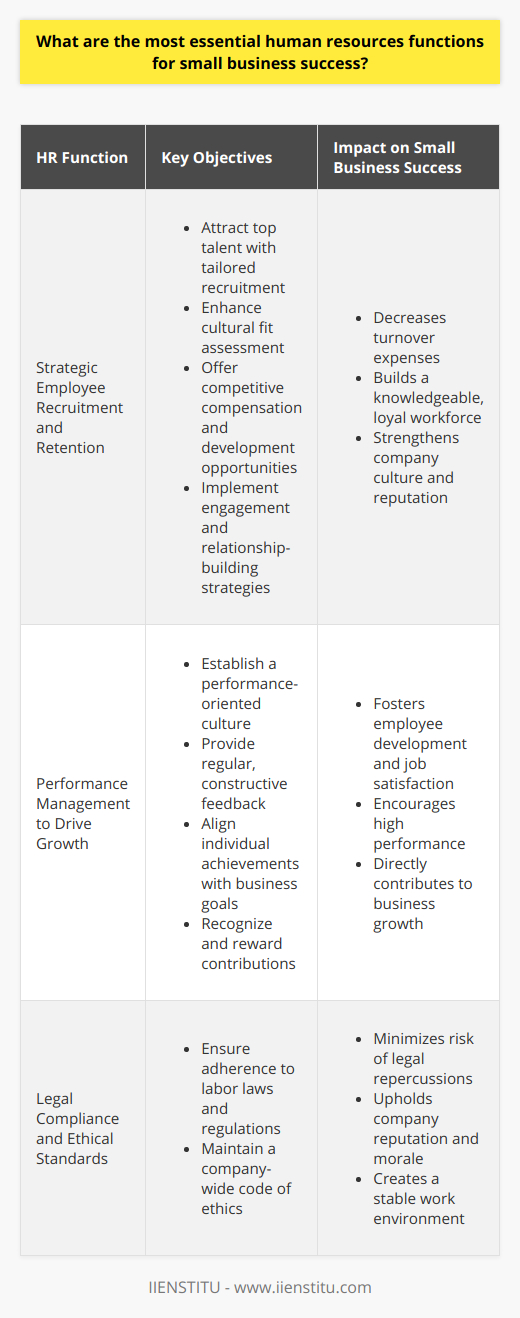
How can effective human resource management contribute to employee retention and satisfaction in a small business setting?
Role of Effective HRM in Employee Retention
Effective human resource management (HRM) plays a crucial role in employee retention and satisfaction, especially in a small business setting. By ensuring clear communication, providing growth opportunities, and fostering a positive work culture, small businesses can benefit from the skills and expertise of motivated and committed employees.
Clear Communication
A key aspect of HRM is maintaining open channels of communication with employees. By establishing regular feedback mechanisms, employees feel heard and valued. Moreover, transparent communication helps clarify expectations, roles, and responsibilities, thus preventing confusion and frustration.
Growth Opportunities
Employees are more likely to stay and contribute to a business if they perceive opportunities for personal and professional growth. HRM practices, such as offering training and development programs, can help employees improve their skills and advance in their careers. Furthermore, recognizing and rewarding employees' achievements can boost their motivation, leading to increased satisfaction and loyalty.
Positive Work Culture
In a small business setting, cultivating a positive work culture is imperative for employee retention. Effective HRM practices, such as facilitating teamwork, encouraging innovation, and promoting diversity and inclusion, create a supportive and inclusive environment. When employees feel respected and appreciated, they are more likely to remain with the organization and maintain a high level of job satisfaction.
Flexible Work Arrangements
Considering the increasing demand for flexibility and work-life balance, HRM should prioritize implementing flexible work arrangements. By offering remote work options, flexible hours, or part-time schedules, small businesses can improve employees' satisfaction and reduce the likelihood of turnover.
Employee Benefits and Compensation
Lastly, competitive compensation packages and benefits play an important role in retaining qualified and competent employees. HRM professionals are responsible for ensuring that employees receive fair and equitable pay, commensurate with their job responsibilities and performance. Providing attractive benefits, such as health insurance, retirement plans, and paid time off, can further improve employee satisfaction and retention.
In conclusion, effective human resource management is essential for small businesses to retain and satisfy employees. By focusing on clear communication, growth opportunities, positive work culture, flexible work arrangements, and competitive compensation, small businesses can benefit from a motivated and committed workforce.
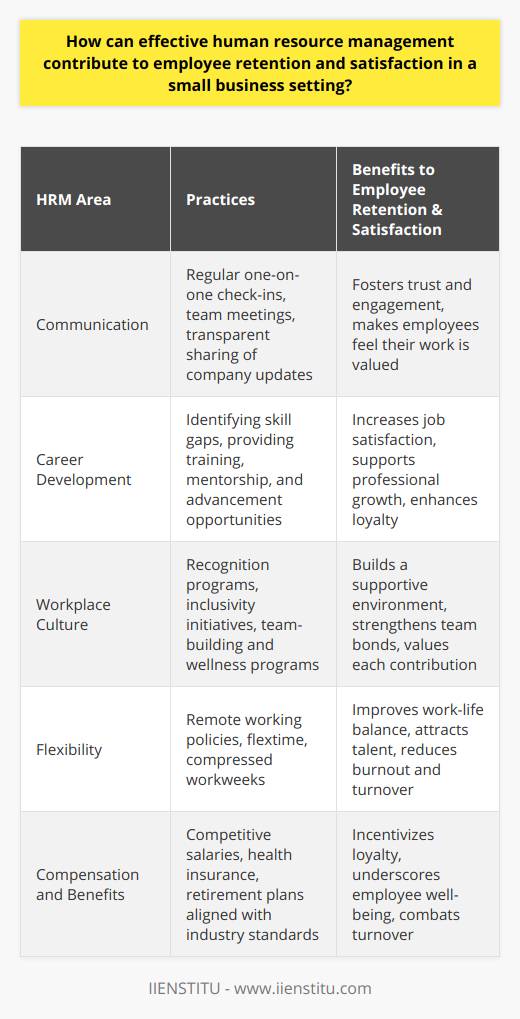
What role does human resources play in strategic planning and decision-making for small businesses?
Role of Human Resources
As an integral component of small business management, human resources (HR) possesses significant influence in the development and execution of strategic planning and decision-making. Primarily, HR ensures the alignment of human capital with the organization's objectives through effective recruitment, retention, and development of employees.
Recruitment and Selection
HR significantly contributes to strategic planning by acquiring talented professionals that fulfill the company's needs. The process includes drafting precise job descriptions, utilizing apt screening techniques, and conducting evaluations to secure candidates that strengthen business performance. In this regard, HR's recruitment and selection expertise directly impacts an organization's ability to attain its goals.
Training and Development
The responsibility of HR does not end with hiring; continuous employee development plays a critical role in maintaining a competent workforce. By developing customized training programs that enrich employees' skills and knowledge base, HR bolsters their productivity, proficiency, and adaptability. As a result, HR's ability to nurture employees supports small businesses in achieving their strategic objectives.
Performance Management
Performance management is another domain where HR's influence on strategic planning and decision-making is apparent. By establishing goal-oriented performance appraisal systems, HR aids in evaluating employees' progress, identifying strengths and areas for improvement, and aligning individual efforts with desired business outcomes. Consequently, this facilitates data-driven decision-making and informs future strategic initiatives.
Retention Strategies
Employee retention is imperative for small businesses, given the high costs associated with turnover. HR has the task of curating a positive organizational culture and devising strategies to maintain high levels of employee satisfaction. By instituting competitive compensation and benefits packages, HR minimizes attrition and preserves the collective knowledge and skills that benefit the organization.
Change Management
Lastly, HR plays a pivotal role in managing organizational change. As a small business evolves, HR must ensure that the workforce is receptive to new policies and practices. By fostering an environment of open communication and implementing change management strategies, HR guarantees a smooth transition during such periods, which positively affects strategic planning and decision-making.
In conclusion, human resources forge a vital nexus between a company's workforce and its long-term objectives. By effectively managing various dimensions of employee recruitment, performance, and retention, HR profoundly impacts an organization's strategic planning and decision-making capabilities. Thus, small businesses must recognize and integrate HR into all aspects of their operations to achieve their desired goals.
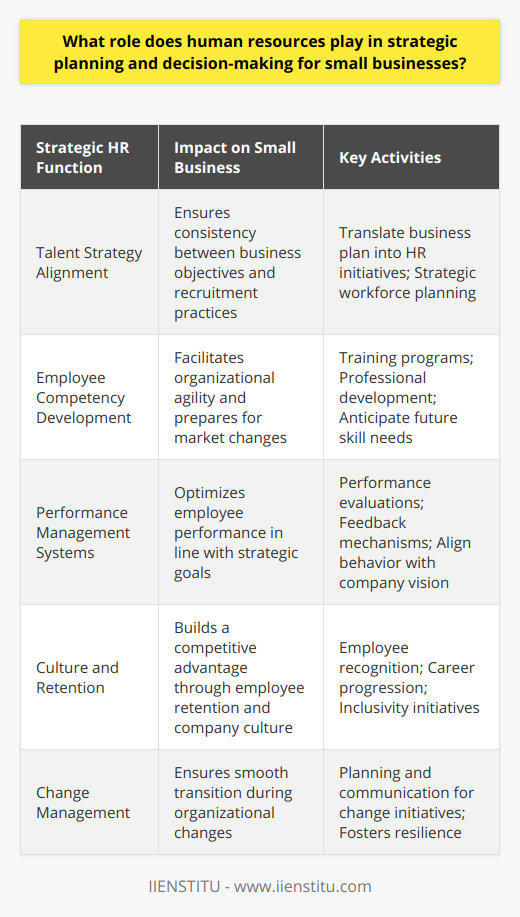
What are the primary challenges faced by small businesses in effectively managing human resources?
Challenges in Human Resource Management for Small Businesses
Limited Knowledge and Expertise
One of the main challenges faced by small businesses in managing human resources effectively is the lack of expertise in human resource management (HRM). Oftentimes, small businesses cannot afford to hire a dedicated HR professional, leaving the responsibility to the already-busy business owner or a non-specialized employee. This results in difficulty staying updated with employment laws, ensuring best practices, and navigating complex HR issues.
Limited Resources
Small businesses typically have limited financial resources, which affects their ability to implement competitive compensation packages, benefits programs, and training and development opportunities. Consequently, they may struggle with employee attraction, retention, and motivation. Additionally, without adequate funding, small businesses may lack necessary technology and infrastructure to support effective HR management, resulting in inefficient processes and outdated practices.
Employee Engagement and Organizational Culture
Another primary challenge faced by small businesses is crafting and maintaining a strong organizational culture to engage and motivate employees. With fewer resources available compared to larger organizations, it becomes more challenging to create a workplace culture that fosters employee satisfaction, productivity, and loyalty. Consequently, small businesses need to be creative in designing and implementing initiatives to build a positive and inclusive work environment.
Talent Acquisition and Retention
Attracting and retaining top talent is a significant challenge for small businesses, as they often struggle to compete with larger organizations that can offer better packages and career development opportunities. In this context, small businesses need to effectively communicate their unique value proposition, such as a more flexible work environment, greater autonomy, and a closer-knit team to appeal to ambitious professionals.
Legal Compliance
Lastly, small businesses face challenges in understanding and complying with the ever-evolving labor laws at local, state, and federal levels. Non-compliance with these laws can lead to significant financial and legal consequences, jeopardizing the business's survival. Moreover, the absence of a dedicated HR professional hampers small businesses' efforts to stay updated on new policies and regulations, increasing the risk of non-compliance.
Conclusion
Overall, small businesses encounter several challenges in managing human resources effectively. Lack of expertise, limited resources, employee engagement, talent acquisition and retention, and legal compliance are some of the primary hurdles these entities face. To overcome these issues, small businesses need to adopt innovative strategies that emphasize their unique strengths, while continuously improving their HR practices and procedures.
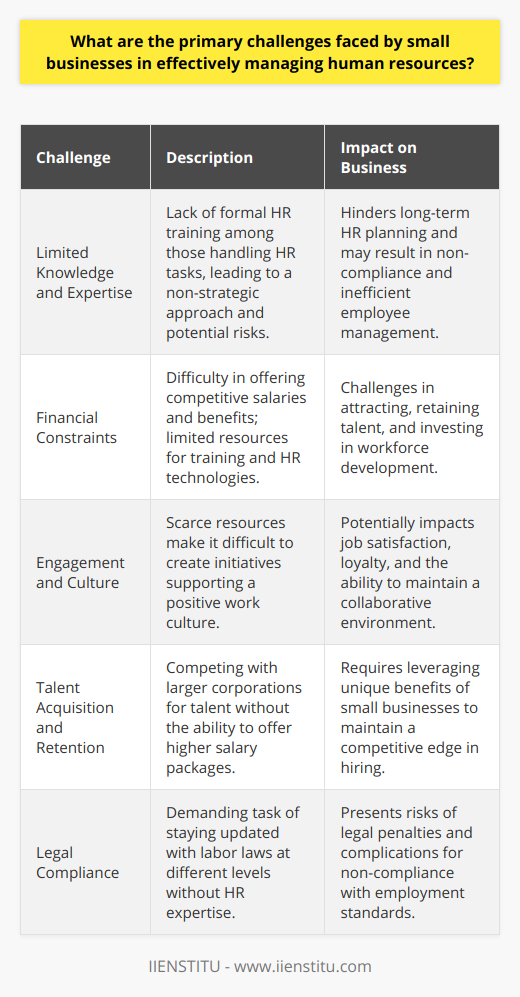
How can technology and automation be leveraged to improve human resources functions in small businesses?
Leveraging Technology for Efficient HR Functions
In today's competitive business landscape, technology and automation play a vital role in transforming human resources (HR) functions in small businesses. Leveraging these tools can streamline HR processes, promote employee engagement, and enhance overall productivity. This paragraph discusses key strategies for leveraging technology and automation effectively.
Streamlining Administrative Tasks
Automation can significantly reduce the time spent on repetitive and administrative tasks that take up considerable HR resources. Tools such as applicant tracking systems (ATS) enable efficient management of job postings and candidate screening. Additionally, platforms for onboarding new hires can automate the distribution of forms, policies, and training materials, simplifying the process for both HR professionals and new employees.
Enhancing Employee Engagement
Using technology to improve communication and provide self-service options boosts employee engagement. HR software with dedicated portals allows team members to access their personal information, benefits, and policies whenever needed. Furthermore, digital communication channels such as team chat apps or intranets facilitate collaboration and knowledge sharing within the organization.
Data-Driven Decision Making
Data analytics in HR allows for informed decision-making based on measurable insights. With advanced software, HR professionals can track metrics such as employee performance, turnover rate, and skills gaps. This data enables the identification of trends and areas for improvement, leading to targeted interventions with a higher likelihood of success.
Remote Work and Virtual Training
Harnessing technology to support remote work and virtual training has become increasingly essential in the modern work environment. Tools such as video conferencing and project management applications can bridge geographical barriers, allowing for flexible work arrangements and remote team collaboration. Meanwhile, online learning platforms expand access to professional development opportunities and help maintain a skilled workforce.
Promoting Diversity and Inclusion
Lastly, technology can support diversity and inclusion efforts in small businesses. Using AI-driven recruitment tools, HR teams can minimize unconscious bias in candidate screening by focusing on skills and qualifications rather than personal characteristics. Moreover, virtual communication platforms enable organizations to foster an inclusive work culture, ensuring every employee has an equal voice.
In conclusion, small businesses can leverage technology and automation to improve various aspects of human resources functions. Streamlining administrative tasks, enhancing employee engagement, promoting data-driven decision making, supporting remote work and virtual training, and fostering diversity are critical strategies to consider. By adopting these innovative approaches, small businesses can achieve greater efficiency, productivity, and overall success.
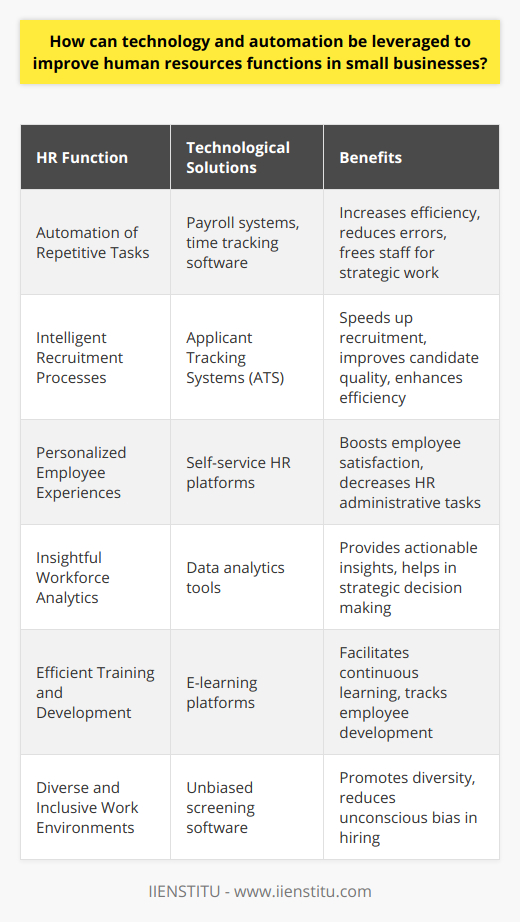
Are performance evaluations and feedback essential for small business employees, and if so, what are the best strategies to implement them effectively?
Importance of Performance Evaluations for Small Business Employees
Performance evaluations and feedback are crucial for the growth and development of employees in small businesses. These assessments serve a dual purpose of identifying employees' strengths and areas for improvement while providing valuable information for their career progression. Small businesses that prioritize performance evaluations are better positioned to retain and motivate their employees, capitalizing on their potential and achieving higher levels of productivity.
Effective Strategies for Implementing Evaluations and Feedback
Establish Clear Objectives and Performance Indicators
Creating a comprehensive and well-defined set of objectives and performance indicators is the first step towards successful evaluations. This helps employees understand their key responsibilities and aligns them with the organization's goals. The performance indicators should be SMART – Specific, Measurable, Achievable, Relevant, and Time-bound.
Regular and Consistent Feedback
The frequency of feedback is of paramount importance. Small businesses should prefer regular, informal feedback over annual appraisals. Such an approach helps employees continuously adapt and improve their performance, mitigating the risks inherent in waiting for periodic evaluations.
Encourage Employee Participation
Including employees in the evaluation and feedback process fosters a sense of ownership and commitment to their goals. Employee participation can be facilitated by self-assessments that mirror the evaluation criteria, allowing employees to reflect on their work and identify improvement areas independently. This creates a more inclusive and transparent system.
Training and Development Programs
Linking evaluations with adequate training and development programs amplifies their impact, allowing employees to enhance their skills and excel in their tasks. These programs should be tailored to meet individual needs identified during the evaluation. This fosters a growth mindset and commitment to continuous learning among employees.
Recognition and Reward System
A well-planned recognition and reward system is essential to translate evaluations into improved performance. Public acknowledgment, timely promotions, and monetary incentives can significantly boost employee morale and motivation. This emphasizes the organization's commitment to the employees' growth and development.
In conclusion, performance evaluations and feedback are essential for small business employees' growth and development. By employing effective strategies such as establishing clear objectives and performance indicators, implementing regular feedback, encouraging employee participation, and offering targeted training and development programs and rewards, small businesses can optimize their workforce's potential and achieve a sustainable competitive advantage.
